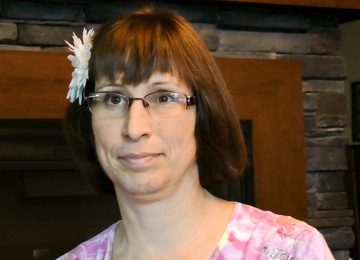Susanne

6 years since diagnosis
Age at interview: 47
Susanne has two sons, ages 11 and 9 years old and is currently not working. She lives on her own since her separation from her husband in October of 2005.
Susanne received her diagnosis on March 18, 2009. Susanne became aware of the possibility of breast cancer screening when she saw a display at her local mall. She took a card and called to make an appointment. Her first mammogram turned out to be fine but her second mammogram, 1 year later, showed abnormal results. Her doctor referred her for a biopsy which was done on March 5, 2009. . Susanne felt grateful that the surgeon was able to do the biopsy and a lumpectomy at the same time. Two weeks later Susanne heard from her doctor that the results of the biopsy had shown that it was cancer. An appointment was scheduled for her with the surgeon that same day. A community outreach worker was able to be with her so that she did not have to go alone to the appointment. Susanne was asked to make a decision within 5 minutes regarding her treatment and the community worker guided her through the advantages and disadvantages of the treatments or procedures. After her sentinel node biopsy, where 8 nodes were removed, she had an axillary node clearance and 18 more of her lymph nodes were removed. Living alone during chemo was very difficult, and she was feeling the effects of chemo-brain. She forgot to take the anti-nausea medication correctly during one cycle. She continued to see her friends every day for a coffee even during chemo when her immune system was low. It was important for her to still go out and about, not stop living and to be out walking in the fresh air.
Susanne had to travel 1600 km for a consultation and for radiation therapy. The most difficult thing about having to travel this far was to say goodbye to her young boys. Her sister lived in the city was able to join her for her consultations. Her parents however, did not visit her during her treatment which was very painful for Susanne. She had to try to accept it because it was winter and travelling would be difficult. Susanne was told that they (the team of oncologists, doctors, nurses and technicians) would take good care of her while going through the treatments. She was also able to make use of support offered to cancer patients by volunteers, relaxation sessions as well as a local support group for grief. When she returned back to her hometown this kind of support was nonexistent. Susanne wished that there was some help for counselling for grief and loss due to partial mastectomy and loss of health due to breast cancer. Susanne started a new journey the day that she received her diagnosis and she feels she learned to be grateful and live “in the moment” from that day forward. There was still a lot of grief and loss; like post trauma grief-upon arriving home.
More content
- Radiation therapy – SusanneA volunteer who supported Susanne during her radiation treatment was a great inspiration for her.
- Chemotherapy – SusanneSusanne felt comfortable in a welcoming and cozy environment for her chemo.
- Challenging emotions – SusanneSusanne described her fears of dying when she had not yet received her full diagnosis.
- Perspectives on treatment pathways – SusanneSusanne was treated rapidly and had a period of 5 minutes to decide whether she wanted to do a lumpectomy and chemotherapy.
- Sexuality, femininity and intimacy – SusanneSusanne felt self-conscious about her body after treatment. She too wondered how she would raise the subject in a social situation.